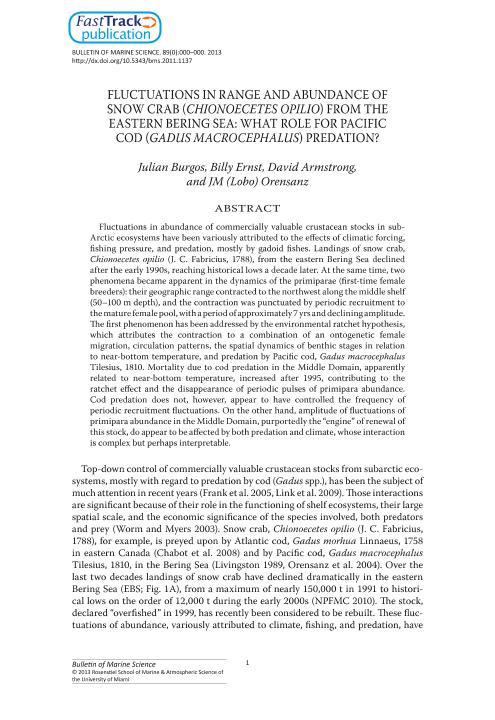Mostrar el registro sencillo del ítem
dc.contributor.author
Burgos, Julian
dc.contributor.author
Ernst, Billy
dc.contributor.author
Armstrong, David
dc.contributor.author
Orensanz, Jose Maria

dc.date.available
2016-05-13T15:12:26Z
dc.date.issued
2013-01
dc.identifier.citation
Burgos, Julian; Ernst, Billy; Armstrong, David; Orensanz, Jose Maria; Fluctuations in range and abundance of snow crab (Chionoecetes opilio) from the eastern Bering Sea: What role for Pacific cod (Gadus macrocephalus) predation?; University of Miami. Rosenstiel School of Marine and Atmospheric Science; Bulletin of Marine Science; 89; 1; 1-2013; 57-81
dc.identifier.issn
0007-4977
dc.identifier.uri
http://hdl.handle.net/11336/5644
dc.description.abstract
Fluctuations in abundance of commercially valuable crustacean stocks in sub-Arctic ecosystems have been variously attributed to the effects of climatic forcing, fishing pressure, and predation, mostly by gadoid fishes. Landings of snow crab, Chionoecetes opilio (J. C. Fabricius, 1788), from the eastern Bering Sea declined after the early 1990s, reaching historical lows a decade later. At the same time, two phenomena became apparent in the dynamics of the primiparae (first-time female breeders): their geographic range contracted to the northwest along the middle shelf (50–100 m depth), and the contraction was punctuated by periodic recruitment to the mature female pool, with a period of approximately 7 yrs and declining amplitude. The first phenomenon has been addressed by the environmental ratchet hypothesis, which attributes the contraction to a combination of an ontogenetic female migration, circulation patterns, the spatial dynamics of benthic stages in relation to near-bottom temperature, and predation by Pacific cod, Gadus macrocephalus Tilesius, 1810. Mortality due to cod predation in the Middle Domain, apparently related to near-bottom temperature, increased after 1995, contributing to the ratchet effect and the disappearance of periodic pulses of primipara abundance. Cod predation does not, however, appear to have controlled the frequency of periodic recruitment fluctuations. On the other hand, amplitude of fluctuations of primipara abundance in the Middle Domain, purportedly the "engine" of renewal of this stock, do appear to be affected by both predation and climate, whose interaction is complex but perhaps interpretable.
dc.format
application/pdf
dc.language.iso
eng
dc.publisher
University of Miami. Rosenstiel School of Marine and Atmospheric Science
dc.rights
info:eu-repo/semantics/openAccess
dc.rights.uri
https://creativecommons.org/licenses/by-nc-sa/2.5/ar/
dc.subject
Snow Crab
dc.subject
Cod
dc.subject
Predation
dc.subject
Population Dynamics
dc.subject.classification
Pesca

dc.subject.classification
Agricultura, Silvicultura y Pesca

dc.subject.classification
CIENCIAS AGRÍCOLAS

dc.title
Fluctuations in range and abundance of snow crab (Chionoecetes opilio) from the eastern Bering Sea: What role for Pacific cod (Gadus macrocephalus) predation?
dc.type
info:eu-repo/semantics/article
dc.type
info:ar-repo/semantics/artículo
dc.type
info:eu-repo/semantics/publishedVersion
dc.date.updated
2016-04-28T14:48:51Z
dc.journal.volume
89
dc.journal.number
1
dc.journal.pagination
57-81
dc.journal.pais
Estados Unidos

dc.journal.ciudad
Miami
dc.description.fil
Fil: Burgos, Julian. Marine Research Institute; Islandia
dc.description.fil
Fil: Ernst, Billy. Universidad de Concepción; Chile
dc.description.fil
Fil: Armstrong, David. University of Washington; Estados Unidos
dc.description.fil
Fil: Orensanz, Jose Maria. Consejo Nacional de Investigaciones Científicas y Técnicas. Centro Nacional Patagónico; Argentina
dc.journal.title
Bulletin of Marine Science

dc.relation.alternativeid
info:eu-repo/semantics/altIdentifier/url/http://www.ingentaconnect.com/content/umrsmas/bullmar/2013/00000089/00000001/art00005
dc.relation.alternativeid
info:eu-repo/semantics/altIdentifier/doi/http://dx.doi.org/10.5343/bms.2011.1137
dc.relation.alternativeid
info:eu-repo/semantics/altIdentifier/doi/10.5343/bms.2011.1137
Archivos asociados
